
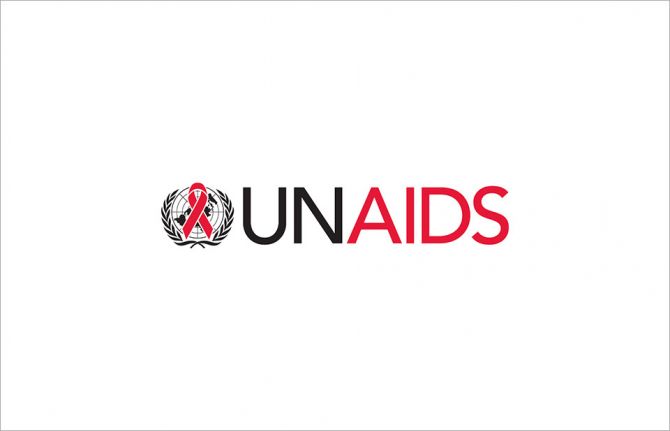
Press Release
UNAIDS hails historic court ruling in St Lucia decriminalizing consensual same-sex relations
30 July 2025 30 July 2025A milestone for human rights which accelerates access to HIV services, free from discrimination in the Caribbean which will advance efforts to end AIDS by 2030
Kingston/Geneva 30 July 2025—UNAIDS celebrates the groundbreaking decision by the High Court of Justice in Saint Lucia declaring sections 132 and 133 of the Criminal Code unconstitutional for criminalizing consensual adult sexual acts in private. This triumph upholds LGBTQ+ people’s rights to protection of the law, privacy, non-discrimination, freedom of expression, and equal protection under the law, as guaranteed by the Constitution.
"This landmark decision underscores the transformative power of the law in protecting human rights and public health," said Luisa Cabal, UNAIDS Regional Director for Latin America and the Caribbean. "In a region where punitive laws hindered progress towards ending AIDS, Saint Lucia's High Court has set a powerful precedent. UNAIDS stands ready to support all governments and communities in ensuring everyone can live free from discrimination and access the services they need to thrive healthily and safely," said Ms Cabal.
The case is one of the five country strategic litigation initiatives of the Eastern Caribbean Alliance for Diversity and Equality (ECADE) which has been working closely with LGBTQ+ organizations, individuals and allies to protect and promote the community’s basic human rights. The case removes out-dated, colonial-era barriers that fuel stigma, discrimination and violence. The Court modified the laws relating to exclude private consensual acts between adults (section 132) and those aged 16+ (section 133), paving the way for dignity and equality to be respected.
Saint Lucia now joins Belize (2016), Antigua and Barbuda (2022), St. Kitts and Nevis (2022), Barbados (2022), and Dominica (2024), which decriminalised same-sex intimacy in recent years. This chronology reflects a surging momentum against outdated laws, fostering more inclusive, rights-based societies across the region.
"The ruling in Saint Lucia gives us hope, demonstrating that justice and equality can prevail and that our courts are advancing public health initiatives by protecting human rights," said Richard Amenyah, UNAIDS Country Director for the Caribbean. "By removing these outdated criminal provisions, we open doors for LGBTQ+ individuals to seek HIV prevention and care without fear, ultimately strengthening our regional fight against HIV and saving lives."
UNAIDS champions this move as a key stride toward zero discrimination and ending AIDS by 2030. By erasing these discriminatory provisions, the ruling removes an obstacle to HIV prevention, testing, and treatment, vital in a region where gay, bisexual and other men who have sex with men and transgender women have disproportionately high rates of HIV and often are kept away from health services for fear of stigma, discrimination and criminalization.
UNAIDS urges remaining countries where these discriminatory laws remain on the books to repeal such laws and prioritize rights-based HIV strategies for healthier futures and more equitable societies.
UNAIDS
The Joint United Nations Programme on HIV/AIDS (UNAIDS) leads and inspires the world to achieve its shared vision of zero new HIV infections, zero discrimination and zero AIDS-related deaths. UNAIDS unites the efforts of 11 UN organizations—UNHCR, UNICEF, WFP, UNDP, UNFPA, UNODC, UN Women, ILO, UNESCO, WHO and the World Bank—and works closely with global and national partners towards ending the AIDS epidemic by 2030 as part of the Sustainable Development Goals. Learn more at unaids.org and connect with us on Facebook, Twitter, Instagram and YouTube.
Contact
UNAIDS LACDaniel de Castro
tel. +507 6998 3175
decastrod@unaids.org
UNAIDS Caribbean
Jaevion Nelson
tel. +1 876 459 3211
nelsonj@unaids.org
Our work
Region/country

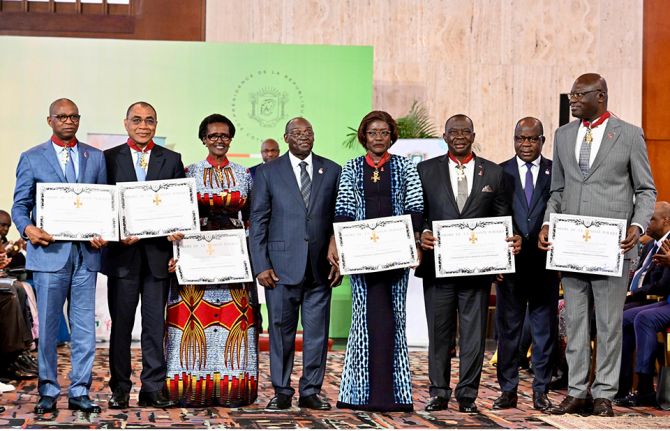
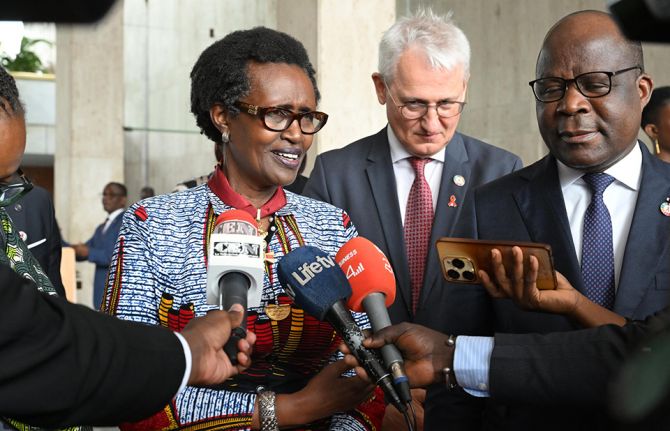
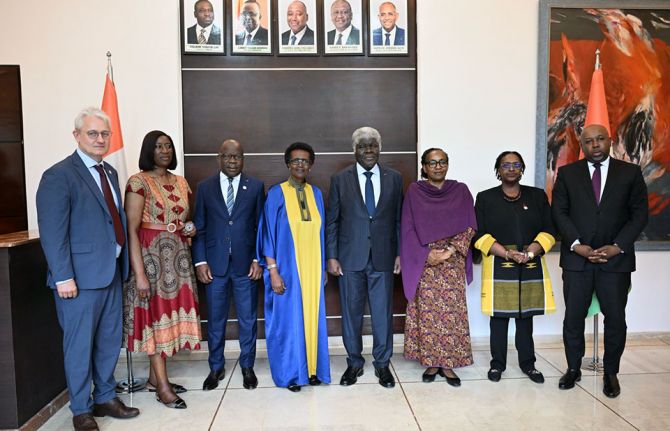
Press Release
UNAIDS commends Côte d’Ivoire’s commitment to increase domestic funding for HIV
24 July 2025 24 July 2025GENEVA/ABIDJAN, 24 July 2025—UNAIDS welcomes the announcement by the government of Côte d’Ivoire to close the funding gap for HIV following cuts from international donors. The Government has committed to invest US$ 60 to 65 million in 2025 and US$ 80 to 85 million from 2026 onwards to maintain critical lifesaving HIV services. These funds are essential to sustain and strengthen the quality of HIV services as part of a nationally owned and led effort to end AIDS in Côte d’Ivoire.
Côte d’Ivoire has been highly dependent on external donor funding for its response to HIV. This announcement represents a monumental shift towards country ownership for a sustainable, long-term commitment to prevent new HIV infections and ensure treatment for all people living with HIV. The government plans to raise the additional funds through increased taxes on goods such as alcohol and tobacco.
“I commend President Ouattara and the government of the Côte d’Ivoire for this bold announcement. It is a prime example of working creatively to ensure that HIV services are not interrupted amidst cuts to donor funding,” said Winnie Byanyima Executive Director of UNAIDS. “The commitment to increase domestic resources is an example to other countries facing funding cuts of how to be creative in mobilizing and allocating resources to ensure continued lifesaving HIV services.”
The government made the announcement during a three-day visit by Ms Byanyima to Côte d’Ivoire between 16 and 18 July. The government reaffirmed the critical role of civil society and communities in the national HIV response, including through domestic resource allocation to strengthen their contribution to the country’s HIV response. It also announced that it would transform the National AIDS Fund into a multi-disease fund, integrate HIV into Universal Health Coverage, primary health care and the broader health system.
Ms Byanyima met with the Prime Minister H.E. Robert Beugré Mambé who said, "Côte d’Ivoire has five priority challenges: women’s vulnerability to HIV and ensuring access to prevention for women and girls; enhancing prevention education for young people; addressing declining donor funding through domestic resources; local scientific research and strategic communication to inform, mobilize and save lives.” He also applauded the long-standing, strategic collaboration with UNAIDS saying, “Thanks to UNAIDS support, Côte d’Ivoire is winning the battle against HIV.”
During her visit, Ms Byanyima participated in the 10th national meeting of the National Programme of the Fight Against AIDS alongside Vice-President Tiémoko Meyliet Koné, who is also the chair of the programme. During the meeting, Ms Byanyima was honored with the title of Commander of the Order of Public Health, the highest distinction of merit in the field of health awarded by the President.
“The bold financial commitment made by Côte d’Ivoire is a powerful example of what political will and national leadership can achieve in the HIV response,” said Ms Byanyima. “Domestic financing is the cornerstone of sustainable health systems, and this decision sends a strong message of national ownership and resilience.”
Ms Byanyima also acknowledged the leadership and critical role of civil society and bilateral support by PEPFAR and international solidarity in the country’s HIV response.
Côte d’Ivoire has made significant progress against the AIDS pandemic, with new infections reduced from 25 000 in 2010 to 8200 in 2024, a fall of 66%. Since 2010, AIDS-related deaths have decreased by 75%, down from 34 000 to 8400 in 2024.
UNAIDS
The Joint United Nations Programme on HIV/AIDS (UNAIDS) leads and inspires the world to achieve its shared vision of zero new HIV infections, zero discrimination and zero AIDS-related deaths. UNAIDS unites the efforts of 11 UN organizations—UNHCR, UNICEF, WFP, UNDP, UNFPA, UNODC, UN Women, ILO, UNESCO, WHO and the World Bank—and works closely with global and national partners towards ending the AIDS epidemic by 2030 as part of the Sustainable Development Goals. Learn more at unaids.org and connect with us on Facebook, Twitter, Instagram and YouTube.
Region/country

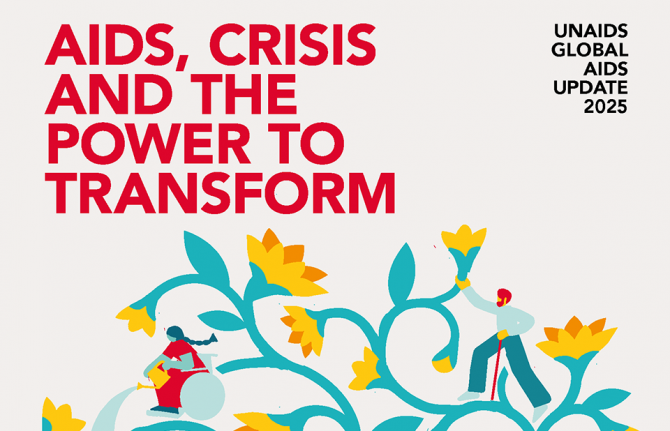
Press Release
Countries must urgently step up to transform their HIV responses amid an international funding crisis that risks millions of lives
10 July 2025 10 July 2025GENEVA/JOHANNESBURG, 10 July 2025—UNAIDS today launched its 2025 Global AIDS Update, AIDS, Crisis and the Power to Transform, which shows that a historic funding crisis is threatening to unravel decades of progress unless countries can make radical shifts to HIV programming and funding.
The report highlights the impact that the sudden, large-scale funding cuts from international donors are having on countries most affected by HIV. Yet it also showcases some inspiring examples of resilience, with countries and communities stepping up in the face of adversity to protect the gains made and drive the HIV response forward.
Some 25 of the 60 low and middle-income countries included in the report have indicated increases in domestic budgets for their HIV responses in 2026. The estimated collective rise among the 25 countries amounts to 8% over current levels, translating to approximately USD 180 million in additional domestic resources. This is promising, but not sufficient to replace the scale of international funding in countries that are heavily reliant.
A global emergency: massive cuts and weakening of aid consensus threaten to reverse progress
Despite marked progress in the HIV response in 2024, the weakening aid consensus and significant and abrupt funding shortfalls in the HIV response in 2025 have triggered widespread disruption across health systems and cuts to frontline health workers—halting HIV prevention programmes and jeopardizing HIV treatment services.
In Mozambique alone, over 30 000 health personnel were affected. In Nigeria, pre-exposure prophylaxis (PrEP) initiation has plummeted from 40 000 to 6000 people per month. If US-supported HIV treatment and prevention services collapse entirely, UNAIDS estimates that an additional 6 million new HIV infections, and 4 million additional AIDS-related deaths could occur between 2025 and 2029.
“This is not just a funding gap—it’s a ticking time bomb,” said UNAIDS Executive Director Winnie Byanyima. “We have seen services vanish overnight. Health workers have been sent home. And people—especially children and key populations—are being pushed out of care.”
Even before the large-scale service disruptions, the reported data for 2024 shows that 9.2 million people living with HIV were still not accessing life-saving treatment services last year. Among those were 620 000 children aged 0—14 years living with HIV but not on treatment which contributed to 75 000 AIDS-related deaths among children in 2024.
In 2024, 630 000 people died from AIDS-related causes, 61% of them in sub-Saharan Africa. Over 210 000 adolescent girls and young women aged 15—24 acquired HIV in 2024—an average of 570 new infections every day.
HIV prevention services are severely disrupted. Community-led services, which are vital to reaching marginalized populations, are being defunded at alarming rates. In early 2025, over 60% of women-led HIV organizations surveyed had lost funding or were forced to suspend services. The United States President’s Emergency Plan for AIDS Relief (PEPFAR) reached 2.3 million adolescent girls and young women with comprehensive HIV prevention services in 2024 and enabled 2.5 million people to use HIV PrEP—many of these programmes have now stopped completely.
Meanwhile, the rise in punitive laws criminalizing same-sex relationships, gender identity, and drug use is amplifying the crisis, making HIV services inaccessible. Countries like Uganda, Mali and Trinidad and Tobago have seen recent harmful and discriminatory changes to their criminal laws targeting key populations, pushing them further from care and dramatically raising their risk of acquiring HIV.
A beacon of hope: countries and communities are stepping up to protect essential HIV treatment gains and progress is being made
South Africa currently funds 77% of its AIDS response and its 2025 budget review includes a 5.9% annual increase in health expenditure over the next three years, including a 3.3% annual increase for HIV and tuberculosis programmes. The government intends to finance the development of a patient information system, a centralized chronic medicine dispensing and distribution system, and a facility medicine stock surveillance system.
As of December 2024, seven countries—Botswana, Eswatini, Lesotho, Namibia, Rwanda, Zambia, and Zimbabwe—had achieved the 95-95-95 targets: 95% of people living with HIV know their status, 95% of those are on treatment, and 95% of those on treatment are virally suppressed. These successes must be maintained and further scaled up.
The report also highlights the emergence of unprecedented, highly effective new prevention tools like long-acting injectable PrEP, including Lenacapavir, which has shown near-complete efficacy in clinical trials—though affordability and access remain key challenges.
“There is still time to transform this crisis into an opportunity,” said Ms. Byanyima. “Countries are stepping up with domestic funding. Communities are showing what works. We now need global solidarity to match their courage and resilience.”
A call for solidarity
The 2025 Global AIDS Update concludes with an urgent call: the global HIV response cannot rely on domestic resources alone. The international community must come together to bridge the financing gap, support countries to close the remaining gaps in HIV prevention and treatment services, remove legal and social barriers, and empower communities to lead the way forward.
UNAIDS emphasizes that every dollar invested in the HIV response not only saves lives but strengthens health systems and promotes broader development goals. Since the start of the epidemic, 26.9 million deaths have been averted through treatment, and 4.4 million children protected from HIV infection through vertical transmission prevention.
“In a time of crisis, the world must choose transformation over retreat,” said Ms Byanyima. “Together, we can still end AIDS as a public health threat by 2030—if we act with urgency, unity, and unwavering commitment.”
UNAIDS report is being launched ahead of the Scientific AIDS Conference IAS 2025 taking place in Kigali, Rwanda, from 13-17 July 2025.
UNAIDS
The Joint United Nations Programme on HIV/AIDS (UNAIDS) leads and inspires the world to achieve its shared vision of zero new HIV infections, zero discrimination and zero AIDS-related deaths. UNAIDS unites the efforts of 11 UN organizations—UNHCR, UNICEF, WFP, UNDP, UNFPA, UNODC, UN Women, ILO, UNESCO, WHO and the World Bank—and works closely with global and national partners towards ending the AIDS epidemic by 2030 as part of the Sustainable Development Goals. Learn more at unaids.org and connect with us on Facebook, Twitter, Instagram and YouTube.
Contact
UNAIDSSophie Barton Knott
tel. +41 79 514 6896
bartonknotts@unaids.org
UNAIDS
Michael Hollingdale
tel. +41 79 500 2119
hollingdalem@unaids.org
Related resources

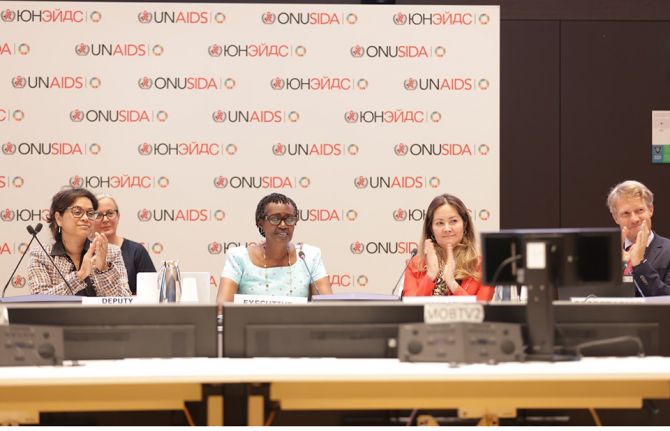
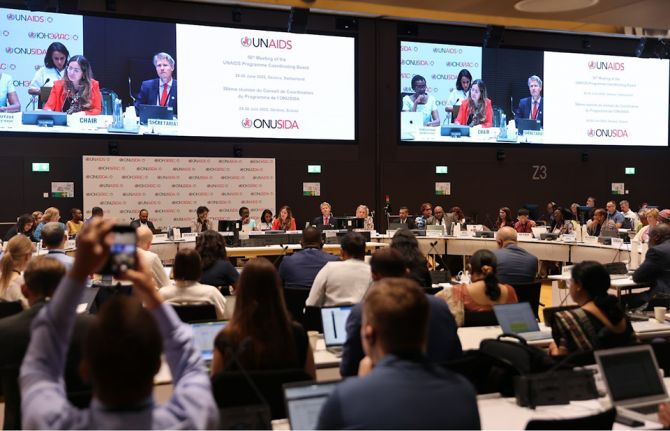
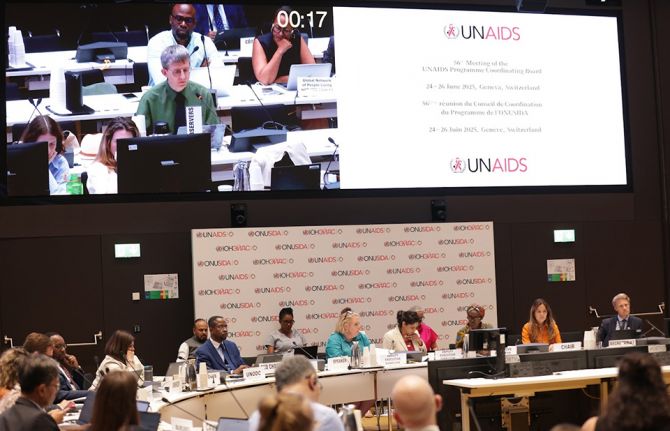
Press Release
‘We do not give up! UNAIDS will continue to stand with governments and communities’ was the message at UNAIDS’ 56th board meeting
27 June 2025 27 June 2025GENEVA, 27 June 2025—UNAIDS 56th Programme Coordinating Board (PCB) meeting concluded in Geneva, Switzerland this week at an unprecedented moment in the AIDS response with sudden and drastic cuts to HIV funding by international donors.
“We are seeing a massive interruption in international HIV financing which has created a systemic shock to the global HIV response, triggering huge disruptions to HIV treatment and prevention programmes around the world,” said Winnie Byanyima, Executive Director of UNAIDS. “However, our Joint Programme was created in crisis—it is in our DNA to face crisis and to fight our way out of crisis. We do not give up—we continue to stand with governments and communities as they commit to finish the fight to end AIDS.”
During the meeting board members endorsed UNAIDS’ new operating model based on the recommendations of the High-level panel for a resilient and fit-for-purpose UNAIDS and the direction of travel of UN80. The operating model underpins UNAIDS’ transformation, including the restructuring exercise currently underway for the UNAIDS Secretariat.
Board members endorsed four core functions for the UNAIDS Secretariat: Leadership and advocacy (including for global resource mobilization); Convening and coordination focused on sustainability of the global HIV response; Accountability through data, targets, strategy; and Community engagement—which will guide UNAIDS’ work going forward.
Board members, member states, civil society, communities, cosponsors and observers—all expressed solidarity with UNAIDS at this challenging juncture and board members showed their continued full confidence in the UNAIDS Joint Programme.
“UNAIDS has been at the centre of shaping programmes and policies for people living with HIV just like myself, and also for people who are risk of HIV like our children, adolescents, women and girls and all key populations. The work of UNAIDS is irreplaceable, it is a broker for governments, civil society and all partners ensuring that affected communities are effectively engaged but also meaningfully engaged in decisions that are made for us and importantly ensuring that the critical role we play in HIV and healthcare is protected. For me this is why the work of UNAIDS needs to continue. Let’s all rally behind the Joint Programme and support its continuity,” said Martha Clara Nakato, non-governmental delegate representing Africa.
An important outcome of the meeting was the Board's consideration of the outline for the Global AIDS Strategy 2026-2031. The Strategy and the 2030 targets, to be adopted in December 2025, will inform the United Nations General Assembly High-Level Meeting on AIDS and the Political Declaration on HIV/AIDS in 2026.
Many countries reiterated their pledges of support to UNAIDS, and a number made new pledges. Ms Byanyima expressed thanks to UNAIDS constant supporters: The Netherlands, Denmark, Australia, Germany, Luxembourg, Ireland, Norway, Canada, Japan and Monaco and showed her appreciation for the contributions received for 2025 and their steady support and leadership over many years.
She particularly appreciated the multiple year commitments made by Denmark, Australia, Netherlands, Ireland, Canada, China, Luxembourg and the UK. “This gives us certainty and predictability,” she said.
On the sidelines of the PCB, Ms Byanyima signed new funding agreements with the Government of the Kingdom of Cambodia as well as with the Government of Flanders.
Belgium reconfirmed its long-standing partnership with UNAIDS through the upcoming renewal of a Memorandum of Understanding for 2025–2028, totalling €12 million. ‘Belgium is proud to be renewing its multi-year agreement with UNAIDS, supporting an effective multisectoral global HIV response that is rooted in human rights and places communities at the heart of the response. Belgium considers global health to be a global public good, which requires continued collective action and international cooperation. We will remain a committed partner in global health, to the fight against HIV and to multilateralism,’ said H.E. Mr. Christophe Payot, Ambassador and Permanent Representative of Belgium to the United Nations.
Ms Byanyima thanked the German Government for advancing €2 million to UNAIDS on their core contribution for 2025 and an additional financial contribution of up to €500 000 for moving additional staff to the UNAIDS hub in Bonn. "The financial situation of the Joint Programme is dire and risks undermining UNAIDS’ crucial work in the global HIV response. In order to help ensure UNAIDS can deliver on its mandate in 2025, Germany is pleased to confirm a further contribution of €2 million as part of our overall commitment," said Paul Zubeil, Deputy Director-General for European and International Health Politics, Germany.
Spain announced that it will be increasing its core support to UNAIDS. Portugal announced that they would be doubling their contribution and Poland announced that they would also be increasing its contribution to UNAIDS.
“The contributions of all of our donors—whether it is core support or extrabudgetary support—provided in the past or present is precious and critical to our success,” said Ms Byanyima.
The 56th PCB was chaired by Brazil, with the Netherlands serving as the Vice-Chair and Kenya as Rapporteur. The Report to the Board by the UNAIDS Executive Director, and the reports for each agenda item and the PCB’s decisions can be found here. The 57th meeting of the PCB will take place 16-18 December 2025, in Brasilia, Brazil.
UNAIDS
The Joint United Nations Programme on HIV/AIDS (UNAIDS) leads and inspires the world to achieve its shared vision of zero new HIV infections, zero discrimination and zero AIDS-related deaths. UNAIDS unites the efforts of 11 UN organizations—UNHCR, UNICEF, WFP, UNDP, UNFPA, UNODC, UN Women, ILO, UNESCO, WHO and the World Bank—and works closely with global and national partners towards ending the AIDS epidemic by 2030 as part of the Sustainable Development Goals. Learn more at unaids.org and connect with us on Facebook, Twitter, Instagram and YouTube.

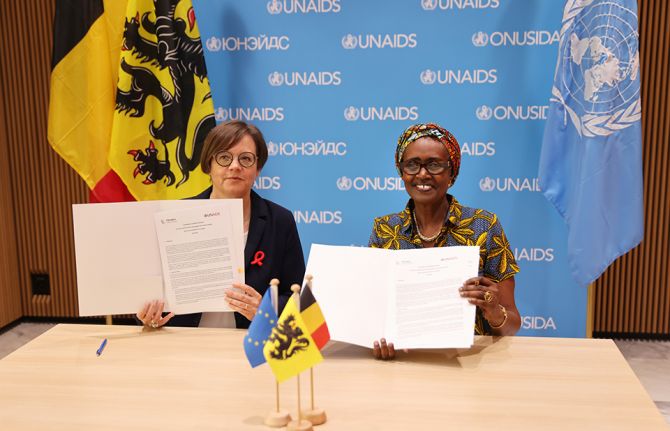
Press Release
Flanders signs new two-year agreement with UNAIDS including €1.5 million contribution to help end AIDS in Africa
25 June 2025 25 June 2025GENEVA, 25 June 2025— UNAIDS and Flanders have strengthened their joint efforts to combat the AIDS pandemic in Africa by signing a new cooperation agreement covering the period 2025—2026.
“I want to thank Flanders for their reliable and continued support to UNAIDS and for their strong leadership during this critical phase of the AIDS response,” said UNAIDS Executive Director, Winnie Byanyima. “In these uncertain times, the consistency of Flanders’ engagement is highly appreciated and greatly valued.”
The agreement was signed during the 56th meeting of the UNAIDS Programme Coordinating Board, with the Flemish delegation headed by Katrien de Pauw, General Representative of Flanders to the United Nations in Geneva.
“To end AIDS by 2030, we must stay the course—we're close, now is not the time to give up. Flanders remains firmly committed to a sustainable finish,” said Ms de Pauw.
The €1.5 million contribution includes an annual €250,000 in core unspecified funds, €250,000 per year in core specified support for Mozambique, and €250,000 per year in core specified support for the seven other most affected countries of Southern Africa.
“This funding from Flanders will make a significant difference to the lives of people living with and affected by HIV in Mozambique, especially for women and girls and other marginalized and vulnerable groups of people. Hartelijk Bedankt Vlaanderen (Thank you Flanders)!” said Phillipe-Serge Degernier, a Belgian national and UNAIDS country director for Mozambique.
With 2.4 million people living with HIV in 2023, Mozambique has the second largest HIV epidemic after South Africa. A total of 2.1 million people in the country are on treatment to keep them well. However, the pause in US funding and the reduction to other international funding streams have complicated efforts to maintain HIV treatment, care and prevention efforts in the country and across the region.
UNAIDS
The Joint United Nations Programme on HIV/AIDS (UNAIDS) leads and inspires the world to achieve its shared vision of zero new HIV infections, zero discrimination and zero AIDS-related deaths. UNAIDS unites the efforts of 11 UN organizations—UNHCR, UNICEF, WFP, UNDP, UNFPA, UNODC, UN Women, ILO, UNESCO, WHO and the World Bank—and works closely with global and national partners towards ending the AIDS epidemic by 2030 as part of the Sustainable Development Goals. Learn more at unaids.org and connect with us on Facebook, Twitter, Instagram and YouTube.
Region/country

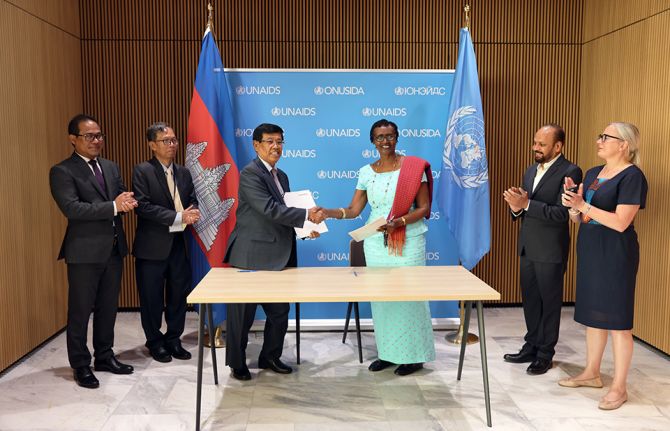
Press Release
Cambodia signs new cooperation agreement with UNAIDS and pledges US$ 100,000 in funding
24 June 2025 24 June 2025GENEVA, 24 June 2025—Cambodia has strengthened their joint efforts to combat the AIDS pandemic by signing a new cooperation agreement with UNAIDS for a year and pledging US$ 100,000.
“This contribution shows the importance Cambodia places on UNAIDS, the HIV response, and the multilateral system,” said UNAIDS Executive Director, Winnie Byanyima. “Considering the significant cuts the global AIDS response faces, we thank you and we appreciate your solidarity.”
Cambodia is on track to achieve the 95-95-95 Global AIDS Strategy targets. Currently 92% of people living with HIV are aware of their status, almost all diagnosed people are on treatment, while more than 98% of those on treatment are virally suppressed. Since 2010, new infections have decreased by 45%. This is a greater decline than overall global results and more than three times faster than the average Asia-Pacific rate of decline.
A Cambodian delegation attended the 56th UNAIDS Programme Coordinating Board (PCB) meeting in Geneva June 24-26, headed by Ieng Mouly, Senior Minister and Chair of the National Cambodia AIDS Authority as well as Dara In, Ambassador and Permanent Representative of Cambodia in Geneva, Switzerland.
“This contribution from the Royal Government of Cambodia is not just a financial investment in the global HIV response,” said Ieng Mouly. “This is also a symbol of our belief in UNAIDS, the UN Joint Programme on HIV, and the multilateral system. Therefore, financial support to UNAIDS is crucial. We urge other countries to commit and invest in UNAIDS to make ending AIDS a reality.”
Cambodia has been a board member of the UNAIDS PCB since 2023 and has recently been re-elected for a second term (2026–2028).
UNAIDS
The Joint United Nations Programme on HIV/AIDS (UNAIDS) leads and inspires the world to achieve its shared vision of zero new HIV infections, zero discrimination and zero AIDS-related deaths. UNAIDS unites the efforts of 11 UN organizations—UNHCR, UNICEF, WFP, UNDP, UNFPA, UNODC, UN Women, ILO, UNESCO, WHO and the World Bank—and works closely with global and national partners towards ending the AIDS epidemic by 2030 as part of the Sustainable Development Goals. Learn more at unaids.org and connect with us on Facebook, Twitter, Instagram and YouTube.
Region/country

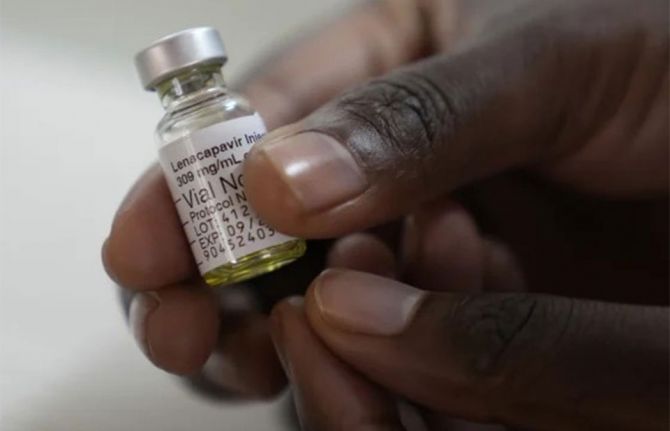
Press Release
UNAIDS urges Gilead to drop price of new HIV prevention shot
18 June 2025 18 June 2025GENEVA, 18 June 2025—The United States Food and Drug Administration (FDA) has approved long-acting injectable lenacapavir for HIV prevention. The new medicine is administered by injection once every 6 months and is a significant step in improving prevention options for people at risk of HIV infection around the world. In an interview with the New York Times, Gilead Sciences has announced a US list price of $28,218 USD per person per year.
In a research paper published in The Lancet HIV this week, experts found that generic lenacapavir could cost $35-$46 per person-year. This could fall to $25 per person-year for a committed demand of five to ten million people within the first year, bringing pricing in line with or lower than current oral PrEP.
Responding to news of Lenacapavir’s FDA approval, Winnie Byanyima, Executive Director of UNAIDS and United Nations Undersecretary-General, said:
“This is a breakthrough moment. The approval of lenacapavir is a testament to decades of public investment, scientific excellence, and the contributions of trial participants and communities. I congratulate Gilead and US partners for advancing this important innovation. Lenacapavir could be the tool we need to bring new infections under control – but only if it is priced affordably and made available to everyone who could benefit.
“UNAIDS has seen research that lenacapavir can be produced for just $40 per person per year, falling to $25 within a year of roll out. It is beyond comprehension how Gilead can justify a price of $28,218. If this game-changing medicine remains unaffordable, it will change nothing. I urge Gilead to do the right thing. Drop the price, expand production, and ensure the world has a shot at ending AIDS.”
UNAIDS
The Joint United Nations Programme on HIV/AIDS (UNAIDS) leads and inspires the world to achieve its shared vision of zero new HIV infections, zero discrimination and zero AIDS-related deaths. UNAIDS unites the efforts of 11 UN organizations—UNHCR, UNICEF, WFP, UNDP, UNFPA, UNODC, UN Women, ILO, UNESCO, WHO and the World Bank—and works closely with global and national partners towards ending the AIDS epidemic by 2030 as part of the Sustainable Development Goals. Learn more at unaids.org and connect with us on Facebook, Twitter, Instagram and YouTube.

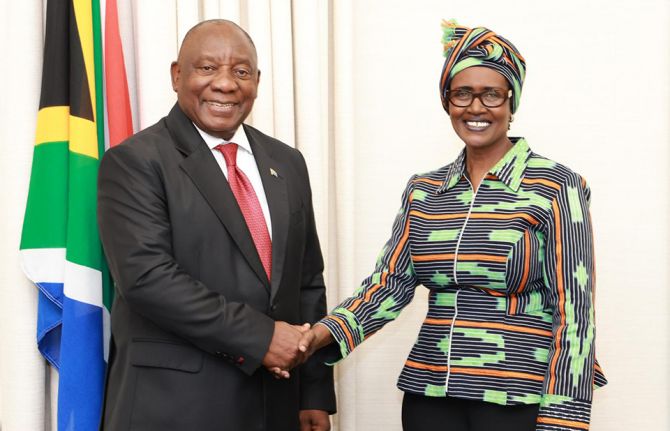
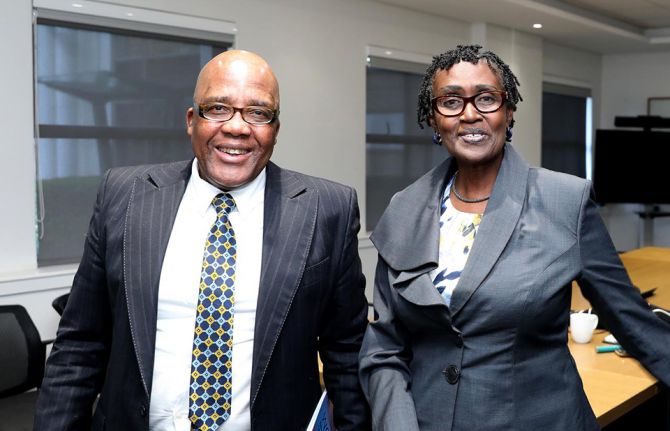
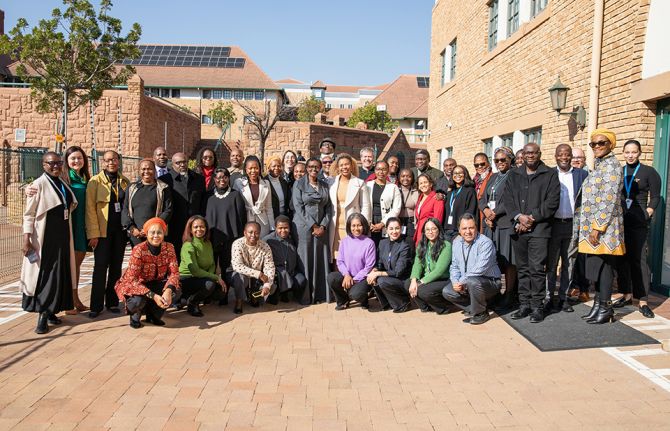
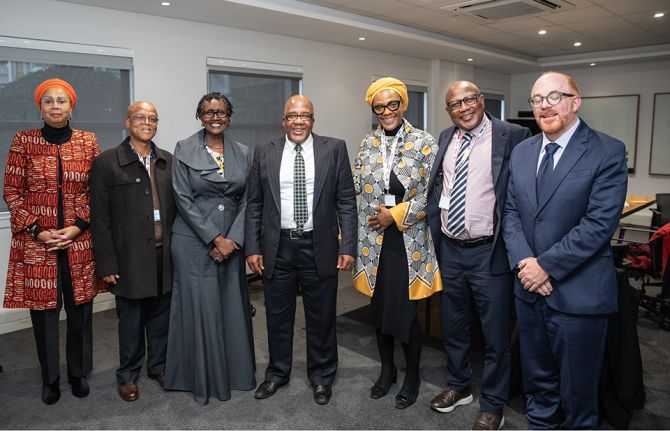
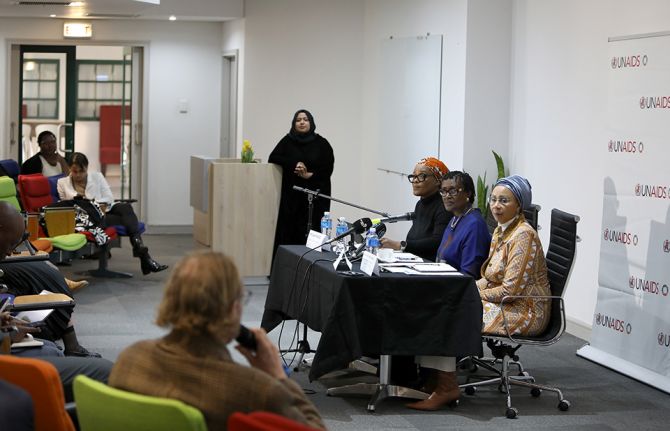
Press Release
UNAIDS Executive Director encouraged by South Africa’s continued leadership in responding to HIV
20 June 2025 20 June 2025GENEVA/JOHANNESBURG, 20 June 2025—The Executive Director of UNAIDS, Winnie Byanyima, has concluded a four-day mission to South Africa. During the visit Ms Byanyima recognized South Africa’s continued leadership in the national HIV response. She also gained a deeper understanding about the impact of the global funding cuts on HIV services, and reaffirmed UNAIDS support to the recently launched Close the Gap campaign—a push to ensure an additional 1.1 million people in the country have access to life-saving treatment.
The visit also served as an opportunity to explore how UNAIDS can support South Africa’s G20 Presidency and the country’s role as co-host of the Eight Replenishment of the Global Fund to Fight AIDS, TB and Malaria—a campaign to raise funds for the three diseases.
“I came here to listen, to understand and to support South Africa, the country with the highest burden of HIV,” said Ms Byanyima. “Around 7.8 million people in the country are living with HIV, the highest number in the world. UNAIDS is supporting the government to ensure that HIV prevention efforts are scaled up, that all people in need have access to treatment, and that South Africa can end AIDS as a public health threat by 2030.”
During her mission, Ms Byanyima’s engagements included a site visit to the Itireleng Community Health Centre in Soweto where she met with health workers and community-led monitors, monitoring HIV service delivery. She also met with civil society organizations and held high-level engagements with President Cyril Ramaphosa and Health Minister, Dr Aaron Motsoaledi. Ms Byanyima commended South Africa for its continued political and financial leadership in its efforts to fill funding gaps to end AIDS.
While she noted South Africa’s significant financial contribution to the country’s HIV response, 76% of which is funded from domestic sources, Ms Byanyima saw firsthand how the loss of US funding (which was at 17%) is affecting HIV service delivery at the community level. She heard how more than 8,000 health workers and 1,600 data capturers who supported tracing and tracking patients in communities, have lost their jobs. Medicine supply chains, laboratories and information systems have been impacted and twelve specialized key population clinics in South Africa funded by the US have also closed.
Ms Byanyima praised both the government and civil society for their leadership and resilience amidst the funding cuts. “In Soweto I saw what the disruptions mean for the country. It is being felt by people most affected by HIV, including adolescent girls and young women aged 15-24 years who account for an estimated third of all new HIV infections–1,057 each week. We are now seeing a bigger gap in HIV prevention services,” said Ms Byanyima.
“But I am very pleased to hear about some of the efforts that are being made by the government to fill the gaps. I learned about the medical records of key population clients being transferred to nearby public healthcare centres where they can get treatment when their usual US funded clinics shut down, and the establishment of a clinic in Hillbrow to provide tailored services for sex workers. The Minister of Health shared ongoing government discussions with the Welcome Trust and the Gates Foundation to address the critical funding cuts in AIDS research that could halt scientific contribution to finding a vaccine. I am seeing real efforts by the government, including the investment of new resources into the national HIV response. This is very encouraging.”
Ms Byanyima’s visit coincided with the G20 Health Working Group meeting in Johannesburg. She reiterated her support to South Africa’s leadership of the G20, to advance international action to enable local production of medicines on every continent and to tackle the resource constraints on health faced by low- and middle-income countries through debt reduction and tax cooperation. The UNAIDS-convened international expert group, The Global Council on Inequality, AIDS, and Pandemics, is helping inform the deliberations of the G20.
South Africa’s leadership of the G20 this year is critical for global public health, as it works to tackle the inequalities that are holding back progress. UNAIDS is working in partnership with South Africa to support the G20 to enable access to medicines, expand fiscal space, and on addressing the social determinants of health.
UNAIDS
The Joint United Nations Programme on HIV/AIDS (UNAIDS) leads and inspires the world to achieve its shared vision of zero new HIV infections, zero discrimination and zero AIDS-related deaths. UNAIDS unites the efforts of 11 UN organizations—UNHCR, UNICEF, WFP, UNDP, UNFPA, UNODC, UN Women, ILO, UNESCO, WHO and the World Bank—and works closely with global and national partners towards ending the AIDS epidemic by 2030 as part of the Sustainable Development Goals. Learn more at unaids.org and connect with us on Facebook, Twitter, Instagram and YouTube.
Contact
UNAIDS South AfricaZeenat Abdool
tel. +27 827 788 080
abdoolz@unaids.org
UNAIDS Global Communications
Robert Shivambu
tel. +27 (0) 83 608 1498
shivambuh@unaids.org
Region/country


Press Release
President Félix Tshisekedi to Launch National Initiative to End Pediatric AIDS in the Democratic Republic of the Congo
10 June 2025 10 June 2025KOLWEZI, LUALABA PROVINCE, DRC, 9 June 2025 — On Friday, June 13, during the closing session of the Governors’ Conference in Kolwezi, Lualaba Province, His Excellency President Félix Tshisekedi will launch the Presidential Initiative to End Pediatric AIDS in the Democratic Republic of the Congo (DRC).
The launch of this bold initiative marks a renewed national commitment to addressing one of the most persistent and heartbreaking inequities in the country’s HIV response: children’s limited access to life-saving HIV treatment and prevention services.
Over recent decades, the DRC has made remarkable strides in rolling out HIV testing and treatment services nationwide. Today, an estimated 91% of adults living with HIV in the DRC are on antiretroviral therapy, thanks to strong collaboration between the government, civil society, affected communities, and key partners including PEPFAR, the Global Fund to Fight AIDS, Tuberculosis and Malaria, UNAIDS and its 11 co-sponsoring agencies, the Elizabeth Glaser Pediatric AIDS Foundation (EGPAF), the private sector, and others.
But progress for children has lagged behind. Only 44% of children living with HIV in the DRC currently receive treatment. This proportion has remained tragically low for a decade, with thousands of children still newly infected each year. These infections are mostly due to missed opportunities to test pregnant women, which would enable timely interventions to prevent mother-to-child transmission and keep mothers alive.
This gap underscores persistent challenges in the health system, including:
- Insufficient access to quality sexual and reproductive health services for women;
- Poor integration of HIV services within platforms for maternal, newborn, child, and adolescent health;
- A fragile supply chain for essential medical commodities;
- Weak community systems and limited coordination between community actors and public services.
The Presidential Initiative to End Pediatric AIDS is a call for urgent and sustained action. It demands greater political leadership and accountability from Governors and provincial authorities, emphasizing the need for local solutions to local challenges. The initiative aims to:
- Improve early HIV screening and quality of treatment for children, adolescents, and pregnant and breastfeeding women;
- Prevent new HIV infections among children and mothers;
- Ensure timely initiation of antiretroviral therapy for HIV-positive adolescents, pregnant and breastfeeding women;
- Eliminate structural barriers that limit access to HIV screening and services for adolescents.
The five-year initiative, backed by at least USD 18 million in domestic funding, will complement existing national programs and investments, mobilizing localized efforts and innovations to close the pediatric HIV treatment gap in every province.
“At a time when global development financing is shifting and placing pressure on the systems that support our most vulnerable, the leadership of President Félix Tshisekedi in launching this initiative is a beacon of hope. UNAIDS salutes the President’s leadership and stands in full support of this bold and inspirational agenda,” said Dr Susan Kasedde, UNAIDS Country Director in RDC.
UNAIDS
The Joint United Nations Programme on HIV/AIDS (UNAIDS) leads and inspires the world to achieve its shared vision of zero new HIV infections, zero discrimination and zero AIDS-related deaths. UNAIDS unites the efforts of 11 UN organizations—UNHCR, UNICEF, WFP, UNDP, UNFPA, UNODC, UN Women, ILO, UNESCO, WHO and the World Bank—and works closely with global and national partners towards ending the AIDS epidemic by 2030 as part of the Sustainable Development Goals. Learn more at unaids.org and connect with us on Facebook, Twitter, Instagram and YouTube.
Contact
UNAIDS DRCNgoy Mukulumpe Raoul
tel. +243 976000092
ngoym@unaids.org
UNAIDS WCA Regional office
Jeanne Seck
tel. +221 78 465 03 46
seckj@unaids.org
Region/country

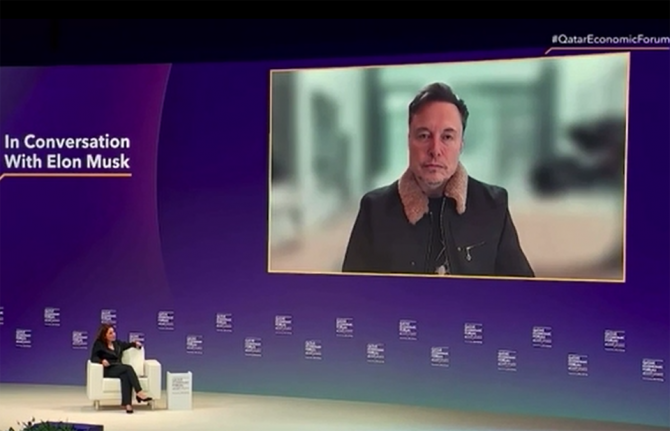
Press Release
UNAIDS encouraged by comments from Elon Musk that he will fix the US funding crisis for HIV services
21 May 2025 21 May 2025Mr Musk made the remarks during an interview with Bloomberg’s Mishal Husain at the Qatar Economic Forum on 20 May
GENEVA, 21 May 2025—UNAIDS is deeply encouraged by the statement from Elon Musk that he will fix the current crisis related to a lack of US Government funding for lifesaving HIV services. UNAIDS is tracking daily the impacts of US funding cuts on HIV services for people living with and affected by HIV around the world as the data and stories of impact on UNAIDS website show.
Currently, many HIV prevention programs supported by the US President's Emergency Plan for AIDS Relief (PEPFAR) have been stalled. The Administration issued a limited waiver providing for continuity of some services, including comprehensive HIV testing and treatment, but it is not being fully implemented within countries, and the waiver excludes almost all HIV prevention services except those for pregnant and breastfeeding women.
For detailed, specific examples of the impact of US funding cuts in dozens of countries see here: Impact of US funding cuts on the global HIV response | UNAIDS
UNAIDS estimates indicate that the permanent discontinuation of HIV prevention and treatment programmes currently supported by PEPFAR would, between 2025 and 2029, lead to:
- An additional 6.6 million new HIV Infections.
- Around 2300 additional new HIV infections per day.
- An additional 4.2 million AIDS-related deaths.
- Over 600 additional AIDS-related deaths per day.
Estimating the potential impact of HIV response disruptions
We can end the AIDS pandemic, but we cannot do so without continued partnership and leadership by the US on HIV prevention efforts for those most in need. Latest estimates show that 1.3 million people were newly infected with HIV in 2023; many were among the most marginalized and vulnerable groups, including young women and girls. Every week some 4000 young women and girls became infected in 2023.
Some countries relied on PEPFAR for over 95% of their funding for HIV and while UNAIDS has been supporting countries' transition to self-reliant nationally funded responses, this transition must be done methodically to ensure no more lives are lost during this process.
UNAIDS has also been impacted by US funding cuts; given the critical roles UNAIDS is playing to build a sustainable future for the AIDS response, the cuts undermine continued progress to end AIDS and transition to sustainability nationally owned and financed HIV responses.
UNAIDS is encouraged by Mr Musk’s remarks and urges the US to continue their leading role in ending AIDS by restoring HIV prevention and treatment funding to countries most affected by HIV. UNAIDS stands ready to work hand in hand with the US to help support sustainable transitions in the coming months and into the future.
Watch original interview:
UNAIDS
The Joint United Nations Programme on HIV/AIDS (UNAIDS) leads and inspires the world to achieve its shared vision of zero new HIV infections, zero discrimination and zero AIDS-related deaths. UNAIDS unites the efforts of 11 UN organizations—UNHCR, UNICEF, WFP, UNDP, UNFPA, UNODC, UN Women, ILO, UNESCO, WHO and the World Bank—and works closely with global and national partners towards ending the AIDS epidemic by 2030 as part of the Sustainable Development Goals. Learn more at unaids.org and connect with us on Facebook, Twitter, Instagram and YouTube.
